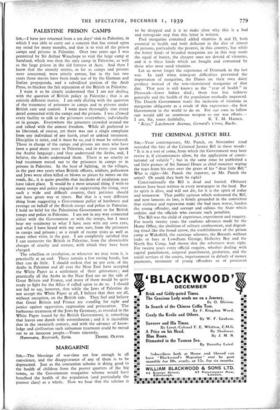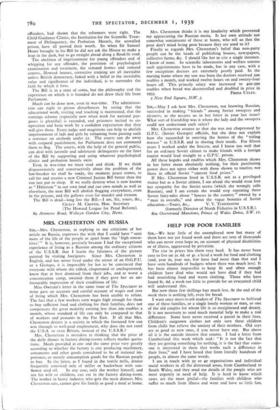THE CRIMINAL JUSTICE BILL
SIR,—Your contemporary, Mr. Punch, on November 22nd recorded the fate of the Criminal Justice Bill in these words: " It is in a sort of coma, from which the Government may later revive it, if circumstances allow, by the application of consti- tutional sal volatile " ; but in the same issue he published a sad little picture of Sir Samuel Hoare as chief mourner wiping the tears from his eyes over the grave of his " dear little Bill." Who is right—Mr. Punch the reporter, or Mr. Punch the artist? Or could they both be right?
Constitutionally the Bill is dead and buried. Obituary notices have been written in every newspaper in the land. But its spirit is alive, and will not die, for it is the spirit of today and tomorrow. That public opinion which welcomed the Bill, and now laments its loss, is firmly grounded in the conviction that violence and repression make the bad man worse, harden the young offender, and corrupt and callous the State which ordains and the officials who execute such penalties.
The Bill was the child of experience, experiment and enquiry. For nearly twenty years the cautious advances made by the Home Office, the abolition of solitary confinement, and degrad- ing ritual like the broad arrow, the establishment of the prison camp at Wakefield, the earnings schemes, the Borstals without locks or bars at Lowdham Grange, Hollesley Bay and the North Sea Camp, had shown that the reformers were right. For twenty years every official enquiry, whether dealing with capital punishment, corporal punishment, probation, and the social services of the courts, imprisonment in default of money payments, treatment of young offenders or of persistent offenders, had shown that the reformers were right. The Child Guidance Clinics, the Institution for the Scientific Treat- ment of Delinquency, the Probation Hostels, the unwalled prison, have all proved their worth. So when Sir Samuel Hoare brought in his Bill he did not ask the House to make a leap in the dark, but to go straight ahead along a flood-lit road.
The abolition of imprisonment for young offenders and of whipping for any offender, the provision of psychological examination and treatment, the remand homes and remand centres, Howard houses, corrective training are all inevitable unless British democracy, linked with a belief in the inviolable value and significance of the individual, is to surrender the faith by which it lives.
The Bill is in a state of coma, but the philosophy and the experience on which it is founded do not draw their life from Parliament.
Much can be done now, even in war-time. The administra- tion can reply to prison disturbances by seeing that the educational work, visiting and teaching is maintained, that the earnings scheme (especially now when work for national pur- poses is plentiful) is extended, and prisoners incited to co- operation and keen work by a confident expectation that they will give them. Every judge and magistrate can help to abolish imprisonment of lads and girls by refraining from passing such a sentence on anybody under 21. The courts can do away with corporal punishment, for Parliament does not command them to flog. The courts, with the help of the general public, can deal with juvenile and adolescent delinquents on the lines of the Bill by supporting and using whatever psychological clinics and probation hostels exist.
Even in war-time we must read and think. If we think dispassionately and constructively about the problem of the law-breaker we shall be ready, the moment peace comes, to call for and receive a new Criminal Justice Bill better than the one just put to sleep. If we really destroy what is now known as " Hitlerism " in our own land and our own minds as well as elsewhere, the next Bill will abolish flogging everywhere, even in the prisons, and the gallows even for murder and treason.
The Bill is dead—long live the Bill.—I am, Sir, yours, &c.,
CICELY M. CRAVEN, Hon. Secretary













































 Previous page
Previous page